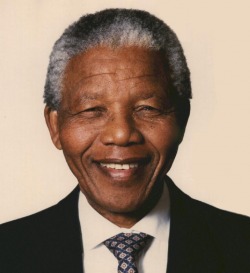Nelson Mandela childhood
Nelson Mandela was born in July 18, 1918 the village of Mvezo which is located in South Africa. His father, Chief Glada was a wise and respectful ruler of the Tembo people. His father had four wives and a total of thirteen children, but because of his beliefs he lost everything including his land and his position as chief. That happened when when Nelson Mandela was still a baby. Nelson Mandela moved next to the village of Mvezo called Qunu. He grew up there playing with my brother and friend. When he was seven, He was the first one in my family to go to school. Standing up for what you believe is something he learned in my childhood.
Nelson Mandela's Education
Many interesting events occurred in his life. He moved to Mqekezweni (the great place) and went to Carkbury Boarding Institute. When he was sixteen, he went to FortHare. It’s a school in the Municipality of Alice run by the British for black students all over Africa. In FortHare, he met my life long friend and associate Oliver Tambo. They were both expelled from FortHare in 1940 for political activism. When Nelson Mandela returned back to Transkei, he discovered that my guardian had arranged him for marriage. Not wanting to get married he fled to Johannesburg and kept a job where he was a night watchman at the gold mine. Nelson Mandela then started as a clerk at a law firm studying in the evening response course with the University of South Africa, and completed my first degree in 1941. Education was very imported to me.
Nelson Mandela's protestest
Nelson Mandela always believed in standing up for what is wrong. he Believed blacks and white should not be segregated, so he also began a political career by joining the African National Congress. It’s a group that vowed to change the black people living in poverty. At the same time he fulfilled his dream in becoming a lawyer with my friend Oliver Tambo. Nelson Mandela continued to protest and one of the effects he did was to organize the blacks leaving their passbook at home. The passbook was a pass for the blacks and if the officers caught them without their passbook they would go to jail. Nearly 1500 people gathered without their passbook in front of Sharpeville police station. The Police Opened fire and killed sixty nine people and wounded hundreds more. It was after this that he was sent to jail for sabotage and stayed there for the next twenty seven years when the government finally released him. He believed that we could change the world through non violent demonstrations.
Nelson Mandela's Accomplishments
During Nelson Mandela's life he wanted to create peace for all blacks and whites. One of his most proud moments were that I help end apartheid. He made a difference for many black people to have equal opportunities and also made the whites realize that black people are still people and should be treated the same way as everyone else. Nelson Mandela will be remembered for my peaceful protest against apartheid, and bringing attention to the troubles in South Africa. Nelson Mandela was released from prison in Robben Island in 1990, in 1993 Nelson Mandela won the nobel peace prize and in 1994-1999 he was the first black prisedent of South Africa.

